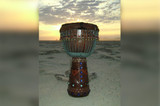Finding Your Rhythm at Renaissance Festivals
Summer is the time of festivals and a drummer’s paradise may be found at renaissance festivals around the country. Frame drums are the notoriously popular renaissance drumming fare and are believed to be the earliest type of skin drum. Traditionally constructed using bent wood and a rawhide head, many cultures have a version of the frame drum. These drums are usually round, but octagon shaped frame drums can also be found. Played by hand or by striking with a mallet, frame drums have entertained people for centuries. Whether used just for fun or with a spiritual purpose, frame drums help keep drumming traditions alive.
Irish frame drums are called bodhrans and they can be seen amid the colorful skirts and ribbons of your average renaissance festival. Sometimes constructed with one or two crossbars on the inside, bodhrans rely upon the hand placed inside the shallow drum for variations in sound. Frame drums are not typically tunable, although some tunable versions can now be found. Bodhrans, in particular, are a frame drum meant to be hit by a stick. The small stick that is used to play a bodhran is called a tipper or cipin and watching a bodhran drummer can be an impressive sight.
Many modern frame drums will include an internal tuning system and are made with synthetic heads. This can be especially helpful during those long, summer renaissance days. Synthetic heads can take the worry out of how the drum sounds, but for those interested in recreating a truer renaissance experience, a skin drum head that is influenced by the heat and humidity might be the preferred choice. Either way, there are so many different types of frame drums from which to choose, the drumming experience is sure to be a delightful one.

Frame drums come in various sizes, something that has been true for them throughout history. Traditionally, larger frame drums were played by men and the smaller ones were played by women. It’s likely that this has more to do with anatomy differences, but for drummers looking to recreate an ancient feel it is something to keep in mind. Bendirs are a frame drum native to northern Africa and Turkey. Bendirs often have snares inside to create a buzzing tone when played. Bodhrans might be considered snareless bendirs and it’s likely that both are appropriate to any renaissance atmosphere. After all, what is a renaissance festival without the frame drum?
Recent Posts
-
What is the Best Size Djembe for Beginners?
If you're new to the world of percussion and interested in learning the djembe, you're in for a t …16th Jul 2024 -
The Benefits of Becoming a Drumming Teacher: Transforming Passion into Profession
Why become a drumming teacher? Becoming a drumming teacher is an excellent way to share your pas …22nd May 2024 -
What Makes the Djembe Drum a Spiritual Instrument in African Music?
Origin and history of the Djembe drum The Djembe drum originates from West Africa and holds sign …16th May 2024




